book reviews
OFFICIAL
Transformers: Exilesby Alex Irvine - fiction - format read: print & digital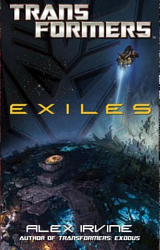
I read this and its sequel a few years ago and barely remember anything, so my review in one word would be "unremarkable". I must also mention that the Aligned continuity and its mythology are far from my favorite, so reading these felt like a chore. There were a few passages I remember liking--good phrasing or little insights into the characters (especially Alpha Trion, but I prefer more eccentric versions of him), but that's about it. |
Transformers: Exodusby Alex Irvine - fiction - format read: print & digital
Of the two, I like this one more. Leaving Cybertron was far more interesting than exploring it. However, I felt like the other worlds (Velocitron, Junkion, etc.) suffered the exact same problem they face in other mediums, which is that they are one-note and gimmicky. I think the novel format should have lent to fleshing them out a bit more, or interrogating what societies with these outlandish structures would actually look like. The characters' conflicting agendas and secrets were very thriller-like but not very exciting to actually follow. |
Lost Bots! (Transformers BotBots) (Step into Reading)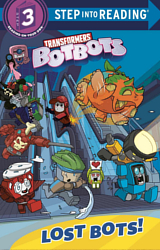 by Lauren Class - fiction - format read: digital
by Lauren Class - fiction - format read: digitalI read this before the cartoon came out, looking for clues as to what it might be like. They do share some similarities. This is a good little read (it will probably take you 4 minutes) with cute art. |
Transformers BotBots Mad Libs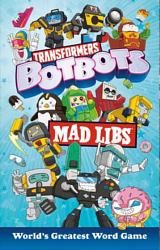 by Mickie Matheis - fiction - format read: print
by Mickie Matheis - fiction - format read: printIt's Mad Libs, but BotBots. Not much more too say. Funny, as expected. Possibly worth it if you've got kids or particularily silly adults, probably not otherwise. |
How to Draw Transformers: Primeillustrated by Nick Roche - nonfiction - format read: print
This is the type of art book where the "sketches" are perfectly form-tool drawn lines that no one in their right mind would ever sketch like, and I do actually think the loosness of the sketch is extremely important to the final drawing... especially considering that Roche has such a dynamic, flowy style and we've seen his sketches and they looks nothing like that! It's kind of cool to see Roche's stripped down pieces but other than that this book doesn't have much to offer. It's better than nothing but far from outstanding. |
You Can Draw Transformersillustrated by Guido Guidi - nonfiction - format read: print
Unlike the TF:P book above where the aim is to draw a robot just standing there (which, don't get me wrong, is a noble goal), this one's overarching mission is to equip you with what you need to make your own Transformers comic. It covers a broad range of art-related topics like perspective, coloring, and illustrating from a script. The text Simon Furman wrote to accompany Guidi's art can be whack at times and it's clear he doesn't fully understand what it's like to illustrate but for the most part the art speaks for itself and is clear and intuitive in what it's trying to show you. It really takes the time to break down Transformers anatomy, how it's similair and different from human anatomy, and how to create your own Transformers-feeling designs as opposed to just drawing pre-existing characters. It's mostly focused on the G1 style but there are small sections for the Beast era and Unicron Trilogy too. I 100% recommend checking it out if you're interested in drawing Transformers! dl here |
The Official How to Draw Transformers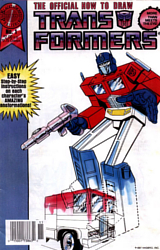 illustrated by Dennis Francis - nonfiction - format read: digital illustrated by Dennis Francis - nonfiction - format read: digitalThis is from the Marvel comics era, which, if you ask me, is before anyone really... figured out how to best draw Transformers. It's definitely not the most in-depth thing ever, but it does explain the purpose of each guideline with the hope of enabling you to draw from different angles and poses. I also really like that it says "be sure to send us a copy!" at the end of every instruction :p |
UNOFFICIAL
Transformers and Philosophy: More than Meets the Mind(Popular Culture and Philosophy Book 40) by John R. Shook and Liz Stillwaggon Swan - nonfiction - format read: print
Like any anthology let alone one from a series with this many installments, this book is a mixed bag. Some essays spent pages and pages laying out what I thought was intuitive or went without saying without offering any particularly interesting nuance or insight (such as, when a transformer converts to its alt mode, their personality doesn't cease to exist/they don't become an object). There were two I liked: Can Metal be Mental? by Matthew Pike, which reminded me of a favorite short story of mine, They're Made Out of Meat, and Robots in Love? by Watson and Arp. There's a good chance you'll like some but not all of the essays. I don't think this is a bad series, I greatly enjoyed the Terminator book, I just don't think what the point of Transformers is to me is as obvious to most people as the point of Terminator. read on archive.org |
Bumblebee & Me: Life As a G1 Transformerby Dan Gilvezan - nonfiction - format read: print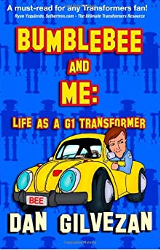
Like Bumblebee himself, this look into his voice actor's experience bringing him to life is short at sweet. If you don't know anything about how the 80's Sunbow cartoon was made, this will be very insightful. If you do know some, this book has a few things that I haven't seen mentioned anywhere else. Gilvezan's love for his costars and coworkers is evident, making it clear where that Autobot affection that comes across in the show springs from. The stories he tells here make it easy to see why the Sunbow cartoon is such a stand-out among 80's cartoons in general, least of all ones made to peddle toys. |
Prime Targets: The Unauthorized Guide to Transformers, Beast Wars and Beast Machinesby Lars Pearson - nonfiction - format read: print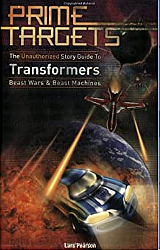
An episode-by-episode, issue-by-issue guide to every Transformers show and comic (at the time of publishing). It filled a similair niche that TFWiki does today, complete with plenty of snarky commentary and insight into fandom attitudes at the time. In addition to being a neat time capsule it actually is a very comprehensive, detail-oriented collection of recaps. I usually have it on-hand when rewatching any of these shows since it sometimes communicates what's happening clearer than the shows themselves or just points out neat things I wouldn't have otherwise noticed, and I found it indespensible in trying to make sense of the difference between the US and UK Marvel comics and their story order. |
What Is the Story of Transformers?by Brandon T. Snider - nonfiction - format read: digital
I haven't read other books from this series and this one didn't make me want to. It's uninteresting at best and inccurate at worse. A decent amount of research went into it but it's obvious that the author gleaned things from reading wikis and whatnot without any understanding of weight or context. If you'd like a rundown of the (mostly early) history of the Transformers franchise for yourself or a friend I'd recommend McFeely's The Basics or the Toys that Made Us episode instead, even though they're different mediums. |
Eugenesisby James Roberts - fiction - format read: digital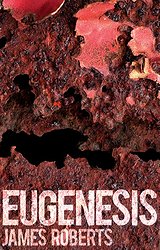
This is the sort of book where it's better every time I read it. The first time around I had read maybe 20 issues of Marvel (and remember, some of them have very small page counts) and it can definitely stand on its own without much knowledge of the source material. The second time I came back after having read all of Marvel UK (minus the annuals) and some other Transmasters UK fanfic, and with all the added context it was even better than the first time. There's a pretty large cast of characters (although not an overwhelming number of parties) and a lot going on, both in what it's doing on its own and how it reacts to its source text and peer fanfics (nowhere near as jam-packed as MTMTE, though, since he didn't have to be afraid of being canned at any time). But really when it comes down to it this is a book about Nightbeat to me. I mean there's like 20 pages of trapped-in-a-cave Nightbeat and Optimus soul-bearing hurt/comfort ffs (which was especially hilarious once I had read Marvel and realized wtf exactly Optimus was talking about), it's amazing. Be warned it can be incredibly dark at times (as in, mental health warning). And sometimes edgy seemingly just for the sake of being edgy. And even when it's not incredibly dark it's still pretty painful (the part where Muzzle's family wouldn't allow Nightbeat to see him because they didn't understand the nature of their relationship actually broke my heart... and I also just think that's great sci-fi writing). read on TFArchive |
The MTMTE Notebooksby James Roberts - nonfiction - format read: print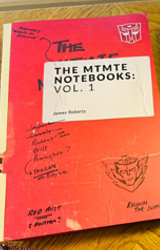
Composed of transcriptions from his writing notebooks and emails within IDW, this is an impressive collection of half-baked ideas. They are pretty small books (about 90 pages each) but most of the wording is very to-the-point so there's a lot of punch per page. Much of these are things he's said at conventions (whether during panels or people posting about their conversations with him), but it's still interesting to see the words as he actually wrote them as opposed to how he or others remember them. I'm impressed he managed to get so close to the ending he originally envisioned with how many unforseen things he was made to include (like the Shadowplay arc and the addition of Megatron). These are defintely worth trying to get your hands on if you're a fan of MTMTE and interested in writing Transformers fiction and/or comics, or just like getting glimpses into others' creative processeses. |
You Can Draw Transforming Robotsby Sherard Jackson - nonfiction - format read: digital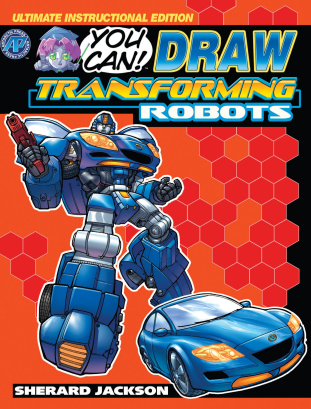
This book breaks down both how to design an original character from their alt mode out and how to better understand the construction of established characters. It covers the design philosophies of different eras like G1, the Beast Era and Unicron Trilogy. The art tips make the book worthwhile on its own, but the art of existing Transformers characters tweaked just enough to avoid copyright infringement add to its entertainment value. |
Mechaforceby E.J. Su - nonfiction - format read: digital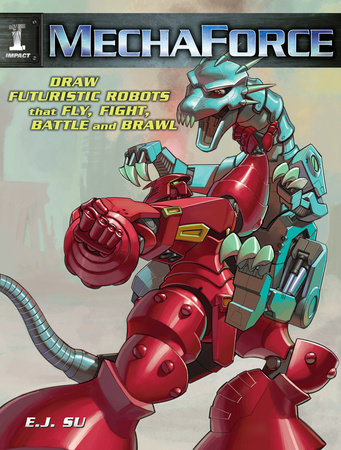
There's no direct relation to Transformers, but this book is by an official comic artist and the generic robots tend to resemble Transformers despite their lack of alt modes. That said, it's relatively thorough, and opens with going over things like perspective, shading, and drawing warmup routines. The anatomy section that makes up the majority of the book is very good and covers how robots are similar to and differ from humans, such as how they tend to have more inaugurated proportions and less range of articulation, and how to design different robotic body types or silhouettes. His advice for drawing mechanical joints which he acknowledges as one of the most difficult things to master is the highlight of the book. There is a short section at the end concerning sequential comic art and action-y illustrations, which, while good, left me wanting more. Overall worth checking out especially if you want something that can apply to Transformers without having to meet HasTak's specifications. |
Transformation: A Personal Journey Through the British Transformers Comic Volume 1: 1984-1987by Stuart Webb - nonfiction - format read: print
...coming soon... |